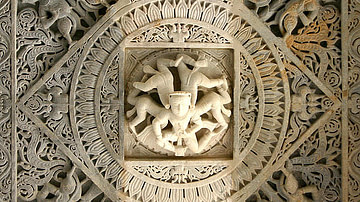Search
Did you mean: Quran?
Search Results

Definition
Ashoka the Great
Ashoka the Great (r. 268-232 BCE) was the third king of the Mauryan Empire (322-185 BCE) best known for his renunciation of war, development of the concept of dhamma (pious social conduct), and promotion of Buddhism as well as his effective...

Definition
Old Kingdom of Egypt
The Old Kingdom of Egypt (c. 2613-2181 BCE) is also known as the 'Age of the Pyramids' or 'Age of the Pyramid Builders' as it includes the great 4th Dynasty when King Sneferu perfected the art of pyramid building and the pyramids of Giza...

Definition
Queen Victoria
Queen Victoria of Great Britain (r. 1837-1901) was one of the most loved of all Britain's monarchs. Her longevity, devotion to her role as figurehead of an empire, and recovery from the death of her beloved husband Prince Albert won her a...

Definition
Franks
The Franks were a Germanic people who originated along the lower Rhine River. They moved into Gaul during the Migration Age, where they established one of the largest and most powerful kingdoms in Europe after the fall of the Western Roman...

Definition
Hildegard of Bingen
Hildegard of Bingen (also known as Hildegarde von Bingen, l. 1098-1179) was a Christian mystic, Benedictine abbess, and polymath proficient in philosophy, musical composition, herbology, medieval literature, cosmology, medicine, biology...

Definition
Ptolemaic Dynasty
The Ptolemaic dynasty was a Macedonian royal family that ruled Ptolemaic Egypt from 323 to 30 BCE. It was founded by Ptolemy I, a general and successor of Alexander the Great. They built Alexandria, including the Lighthouse of Alexandria...

Definition
Magna Carta
The Magna Carta or 'Great Charter' was an agreement imposed on King John of England (r. 1199-1216) on 15 June 1215 by rebellious barons in order to limit his power and prevent arbitrary royal acts like land confiscation and unreasonable taxes...

Definition
Jainism
Jainism is one of the oldest religions in the world. The name comes from jiva (soul or life force but, capitalized, is also given as Spiritual Conqueror) as it maintains that all living things possess an immortal soul which has always and...

Image
Family Tree of the Ptolemaic Dynasty of Egypt (305-30 BCE)
This infographic illustrates the royal lineage of the Ptolemaic Dynasty, which ruled Egypt during the Hellenistic period (305–30 BCE). Founded by Ptolemy I Soter, a companion of Alexander the Great, the dynasty is notable for elevating royal...

Definition
Gandhara Civilization
The Gandhara Civilization existed in what is now Northern Pakistan and Afghanistan from the middle of the 1st millennium BCE to the beginning of the 2nd millennium CE. Although multiple major powers ruled over this area during that time...